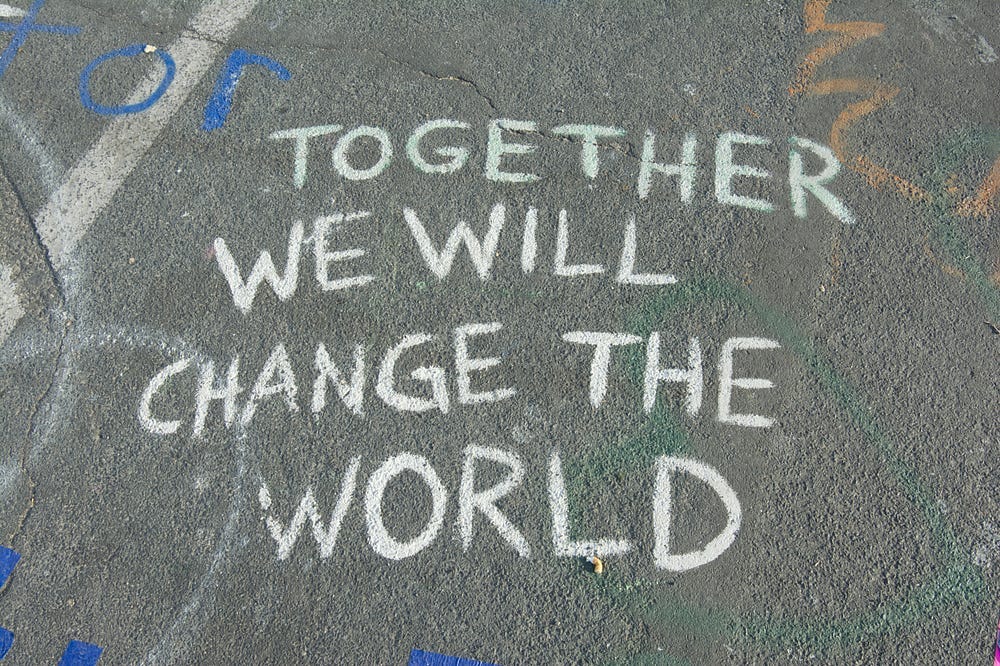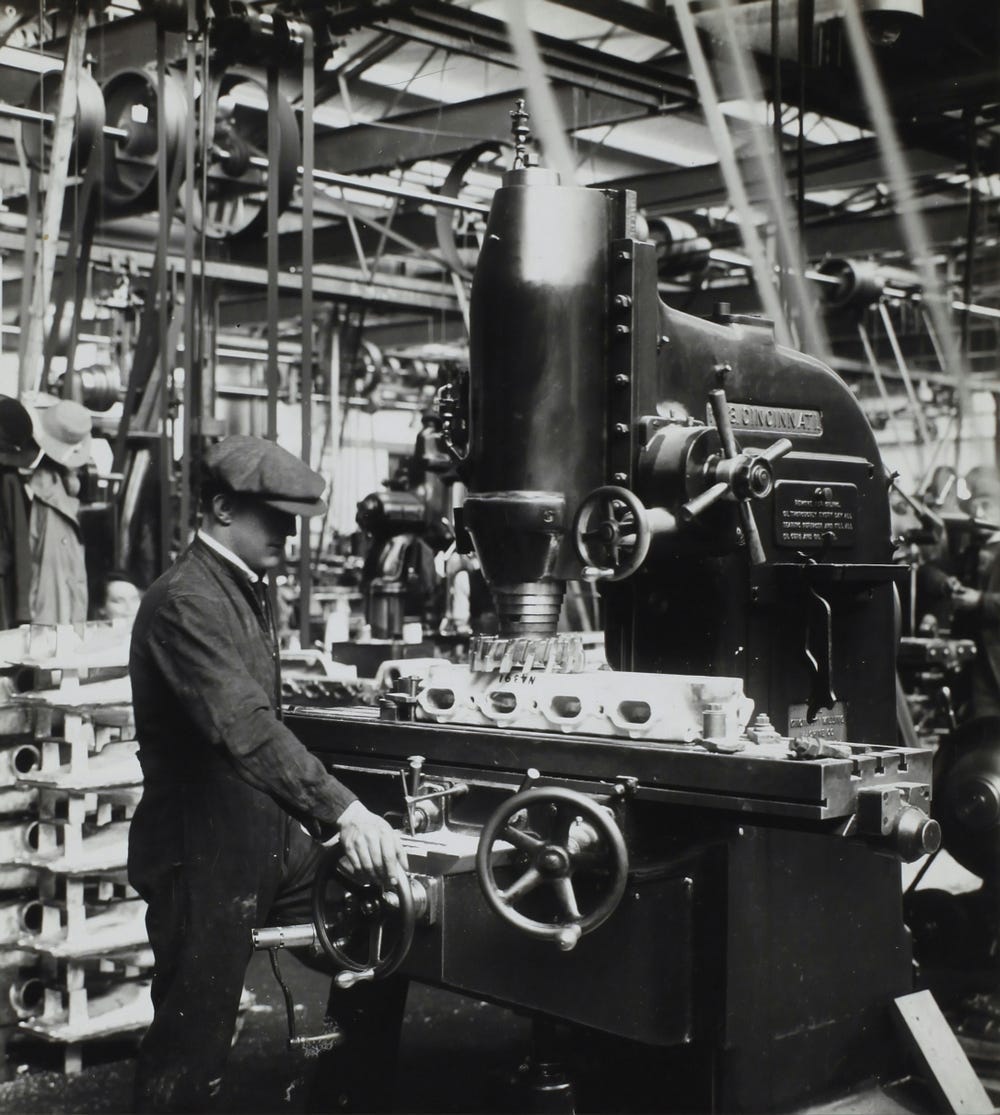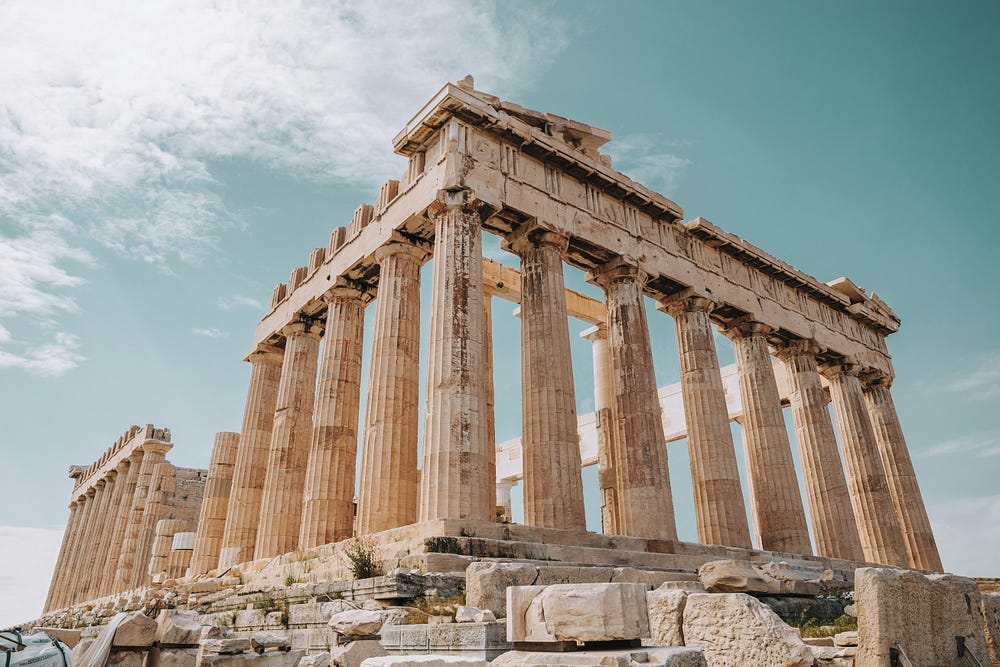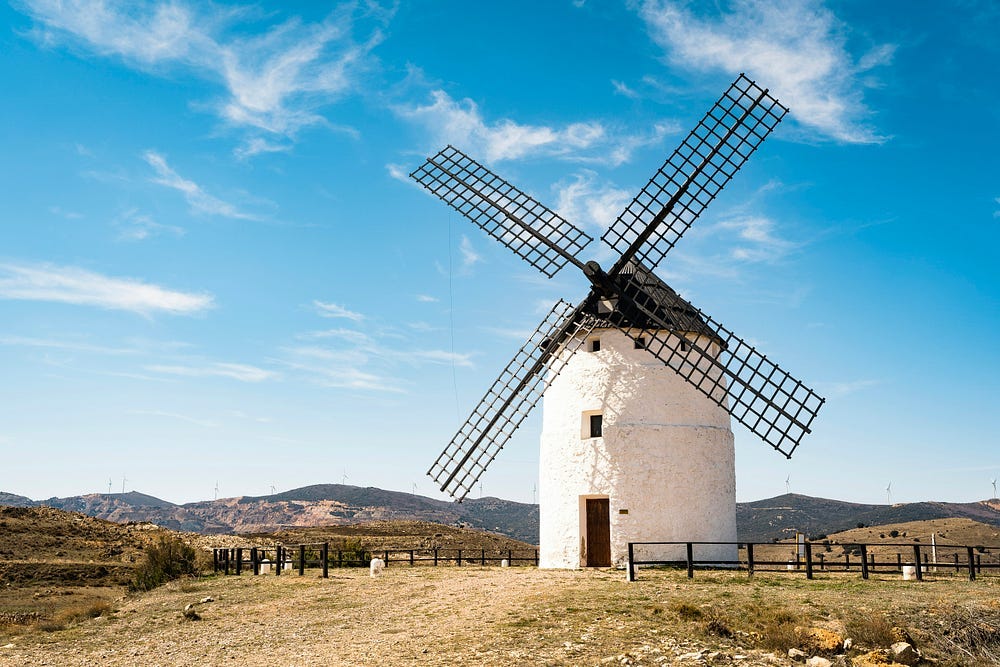
One of my favorite tropes — used by activists of all stripes— is ‘acting like a rock in a stream’. According to this metaphor a handful of people could become a catalyst for change, simple by standing firm. (An act often taken quite literally, like demonstrators gluing themselves to the road or large immovable objects). The idea is that after attracting a number of like-minded people, together they could create a tipping point, beyond which history would be forced to change its course — not unlike a river, after having a large enough number of rocks thrown into it. Now take a look at the chart below, depicting an exponential rise in atmospheric CO2 concentrations, and see if the metaphor has earned a merit.

What went wrong? Well, let’s start with the misleading scale of the change needed. While you can collect a handful of folks to throw hundreds of stones into a river, it’s an entirely different thing to alter the behavior of millions of people — let alone having an effect on how the rest of the eight billion of us behaves. One of the many important, and often overlooked aspects of wicked problems (like climate change, or ecological destruction) is that their scale go well beyond what a single human — evolved to live in a tribe of thirty to a hundred folks — could ever comprehend. Despite all the technical gimmicks of this civilization like the internet, we are still the same humanoids who roamed the land looking for food ten thousand years ago. And while one of our ancestors could surely act like a stone in a river among a hundred of his kin, the same feat is neigh on impossible today when faced with a flood of millions, if not billions of people all minding their own business.
The second — equally underappreciated — factor of societal change, is our diversity of thoughts and values. So, while its perfectly possible to collect thousands, even hundreds of thousands of followers for an idea (even for a fringe blog like this), it’s neigh on impossible to convince more than a small percentage of the population of your right. Name a thought, an idea, a religion, an ideology, and I can name at least two other similarly sized groups with a diametrically opposing view on the matter. We as a species, are just that diverse. And while this seems like a huge issue (at least for some), this trait will eventually save our species somewhere down the line… Perhaps, in the not-so-distant future already, but more on that later.
Third, and this brings us to the main topic I wanted to discuss with you today, let me talk about why this civilization seems wholly uninterested in saving itself. To start with, there is no “civilization” as a single entity. This is just a convenient phrase, referring to a way of living and conveying a certain sense of belonging. It’s not a sentient being with its own ideas on how to improve itself. Yet it’s still more — much more — than a lose collection of humans. It’s a complex adaptive system with the sole purpose of converting all the energy and raw materials available to it into copies of itself. Nothing more, nothing less.
In this sense, it is a mindless “being” busy “civilizing” the world around it: ‘bringing (a place or people) to a stage of social and cultural development considered to be more advanced.’ In plain English: turning forests into farmland and plantations, iron ore into bridges, high rise buildings and cars, or fossil fuels into useful work making all this “civilizing”, as we know today, possible. “Civilization” does not have a vision or goal, neither does it care if this whole process is sustainable or not. — *Crunch, munch, gulp* — It does not care about the future, nor the past: it only exists (or does what it does) in the present. Mind you, no one designed it to be as such, it has evolved to be exactly the way it looks like today. Simply put: out of the many ideas on how to live a good life, modernity — the industrial scale consumption of the planet — has prevailed. Not because it was the best in absolute terms. No. Just because it could.

Steam engines, concrete, just like many other inventions tied to the Industrial Revolution, are much older than most of us think. These ideas could only proliferate the way they did a couple of centuries ago because all the necessary inputs were there in adequate quantities, and there was a need to build them… Take away any of the above, like coal, iron ore, or a pressing need to solve problems (like the loss of forest cover in Europe and thereby a lack of fuel and building material), and the whole concept of starting a “revolution” would’ve been dead on arrival. The irony was that by solving one problem (a lack of fuel) we created ten others in need of a solution. Something, which has inevitably created so many side-effects that we better call them together a polycrisis… Again, no one has intended to destroy the world with technology — things like burning coal just looked like a terrific idea back at the time.
We can safely infer at this point, that our high tech, modern “civilization” was never designed to be sustainable. As we have seen, it wasn’t designed to be anything at all. It just “came to be”, serving as a perfect example for what ecologists call an emergent phenomenon. When so many seemingly independent actors (in this case millions, then billions of bipedal apes) do their own thing, unexpected things pop up. Likewise, no one had the idea to start an industrial revolution, it just came to be. James Watt did not have the conception to act as a rock in the river by inventing the steam engine, ultimately to bring about an explosion in science and technology. He just wanted to make a better steam engine. That’s all. The great sociologist C. Wright Mills summed up this phenomenon the best:
“Fate is shaping history when what happens to us was intended by no one and was the summary outcome of innumerable small decisions about other matters by innumerable people.”
Thinking of modern civilization as a complex, emergent, ephemeral event — embedded into a reality largely out of our control — raises the question: who is actually in the helm, then? Not the President for sure. Not this one (definitely), but neither the previous one, nor the one before him. No, not even the Illuminati, the Freemasons, Lizards or Satanists. These are just comforting ideas, making us feel that if we could get rid of “them”, then we could bring about heaven on Earth. Most of us would find the truth more worrisome and discomforting: namely that no one is in control. Sure, there are several (admittedly) very powerful special interest groups, like the fossil fuel lobby, investment firms, big tech, pharmaceutical companies, the military-industrial-congressional complex, big agriculture businesses, mining companies, and many more, but none of them is able to dictate all the terms to everyone else. What we thus see is a constant struggle for power, favors and government largesse. A fight for profitability and shareholder returns, perceived or real special interests, but ultimately for survival driven by the eat or be eaten principle. Since it’s considered perfectly normal and legal to buy (ahem, support) politicians via campaign donations, or by offering up cushy seats in management boardrooms (with a compensation package to match), one cannot be surprised that liberal democracies have eventually all degenerated into oligarchies. A coercive power structure, relying on public obedience (or outright oppression), in which power rests with a small number of people. Oligarchy is thus a rule by the rich and powerful — ‘a perverted form of aristocracy’ — to paraphrase Aristotle.

As you can see, there is nothing new in this. Democracy, or empowering every citizen to have a say in politics through elected representatives, it seems, was never more than a fleeting idea, quickly thrown back onto the compost heap of history every time it made an appearance. Organizing elections every four to five years — where the public is ‘free’ to choose from a handful of carefully cherry-picked candidates, all pushing the agenda of their wealthy donors — and calling it a ‘democracy’ or a ‘republic’, should thus be considered an insult on voters intelligence. But its not. Instead it’s used to obtain the “consensus of the governed”, and thereby achieving quiet obedience, while nothing substantial ever has the slightest chance to change. Western politics indeed have become a caricature, an inverted reality where war is peace, the oppressed is the aggressor and where the economy is doing just fine (if that’s not your perception, then its your fault). In fact, with the increasingly obscene censorship exercised by big tech on behalf of the permanent bureaucracy, and the labeling of everything but the mainstream narrative ‘misinformation’ (even if it’s later admitted being true), we are not very far from outright oppression either.
The system has a fatal flaw, however. Notwithstanding all the fluffy rhetoric — but fully in line with neo-liberal economics — none of its institutions and companies are driven by a purpose, other than making a profit and thereby accumulating more wealth and power. Thus when its more profitable to produce costly boondoggles, rather than systems that are easy to use, require low maintenance and most of all: cheap to produce, the former will be selected. Always. The same goes to producing low tech, easy to repair, sturdy household equipment, as opposed to “smart” refrigerators giving up the ghost in less than a decade and costing a fortune to bring back to life. And when the feedback loop closes in legislature creating a permanent demand for such boondoggles, the circle becomes hard to escape. This relentless profit and rent seeking has turned the economy into a wealth pump: with ever costlier to maintain institutions, endless wars waged for the enrichment of the few, and companies hardly doing useful products or services anymore. And when you add resource depletion to this picture (i.e. running out of cheap and easy to produce raw materials and energy), outsourcing manufacturing to places where material, energy and labor inputs are still cheap looks like a fantastic idea… Unless you consider that your economy will eventually become wholly dependent on imports, ending up producing nothing it needs, except more billionaires vying for power, and even more “elites” with student loans to pay.
In such a sociopolitical environment, climate change, resource depletion, pollution, ecological collapse and the rest of the polycrisis becomes a political battleground. Not an actual “problem to be solved”, but a way for a representative of certain oligarchs to get ahead of another representative of another self-serving interest group. Welcome to multistakeholder capitalism, “giving corporations even more power over society, the economy and the environment, at the expense of national democratic institutions.” (I highly recommend reading Nick Corbishley’s excellent account on the matter.) How someone gluing themself to a street or spraying tomato soup over a painting could change this dynamic is beyond me…
Be them companies, or government institutions, our modern centers of power are only interested in their own day-to-day survival, not the survival of the system, let alone the planet. These mini self-organizing complex systems are beholden to the same laws like the superorganism (“civilization”) they make up as a whole. Oil companies for example are only interested in producing more oil for profit, mining companies are only interested in producing more copper and selling it at a decent price, and they could not care less that thereby they both destroy the natural world, deplete freshwater and mineral resources, or pollute the very air their wealthy owners breathe. These, and basically every other company above a certain size, have become mindless amoebas consuming resources — humans, minerals, nature — and churning out profit; expressed in numbers and percentages on a computer screen of a stock trader trying to make a rich oligarch even richer. At least on paper.
“Yes, the planet got destroyed, but for a beautiful moment in time we created a lot of value for shareholders.” — Tom Toro
If that’s not the ultimate irony of this civilization, then nothing is. How about a more purpose driven society then, which instead of maximizing profit, would optimize for human well-being as its purpose? And if you consider a healthy, livable, pollution free environment as part of that well-being, why not trying to optimize for both? We are neither separate, nor separable from the world around us. The health of rivers, forests and air is the health of us. There is no “Team Human”: you cannot be pro human, without being pro Nature. We are the result of thousands of species living before us, and a product of an environment which made our existence possible. So why not abandon this whole concept of “wealth creation” and accumulation, and start an Ecotechnic society instead?

For now, and for us inmates, all this might sound like science fiction. We are trapped in an inherently unsustainable, self-destructing civilization led by a delusional, exceptionalist, self-serving and honestly dangerously stupid elite unable to see their own folly. We are not very far from the point, however, where the current setup will buckle under the many stresses it suffers from. Debt. Inequality. Environmental destruction. Energy cannibalism, driven by the depletion of rich oil and mineral deposits, leading to a loss of profitability across the board. And while many fear that we will end up with a regime not seen since the run up to WWII, I believe we will witness the biggest flops in living memory.
“How did you go bankrupt?”
Two ways. Gradually, then suddenly.”― Ernest Hemingway, The Sun Also Rises
The western led economic world order is cracking, and after decades of gradually eviscerating itself, its resources, its population, and that of the rest of the world, it is getting ever closer to that moment of “suddenly”. If you thought that the fall of the Berlin Wall, and ultimately the Soviet Union was a big event, then wait for the coming disintegration of the Western financial and alliance system, together with the many of its constituent states. It’s impossible to tell when that crash will come, but just like the fall of its main rival towards the end of the last century, it will hit many by surprise.
This event will leave no one intact, neither in the emerging Eurasian powers, nor the oligarchs running the West (let alone their population). It will wipe out all the paper wealth, exposing it as nothing but ‘funny money’, together with many zombie companies and bloated institutions. This isn’t going to be a one-night affair either, but a multi-decade long transition, marking the beginning of the next chapter in our social evolution as a species. A time of great uncertainty, danger and opportunity, where the many answers on ‘how to live a good life’ will again have their chance to be tested. Change is coming, but not because someone has glued themself to a street, but because the current modus operandi has become wholly untenable. Plan accordingly.
Until next time,
B
Notes:
Ecological destruction resulting from overshoot (the overconsumption of resources and polluting the environment beyond measure) has no solution, only an outcome. In other words it’s a predicament, not a problem. Thus anyone offering remedies to any of its symptoms, like climate change, without admitting that its root cause is systemic, is selling snake oil. Not willing to face the gravity of our situation, and not preparing for its many outcomes, is thus maladaptive and will result in an even bigger crash than what otherwise awaits. Don’t wait on your government, though. Plant a garden. Learn to live on less. Get rid of all your debts. Rely less on inputs from faraway lands. Pick up useful skills like cooking meals from scratch and simple local ingredients, or repairing household equipment, mending clothes etc. Develop an adaptive mindset and a strong will to live, no matter what life brings. Embrace frugality and prudence. Prepare for a marathon lasting many decades, not a sprint lasting for a month or two. At the same time, do not forget to enjoy modernity while it lasts. Life is beautiful.
Thank you for reading The Honest Sorcerer. If you would like to support my work, please subscribe for free or consider an annual subscription, perhaps leaving a tip. Every donation helps, no matter how small. Thank you in advance!






Ok Great! The World is burning up.
I just gave my car away. I will walk everywhere.
I quite my job and took all my savings and flushed them down the sewer. I don't want to be tempted into buying stuff
I wander the highways scraping up road kill then eating it raw ... don't want to participate in the industrial food chain
I am going to abandon my house tomorrow and live in the bush .. just looking for a cave.
My goal is nett zero.
Come join me?
I thought so
Climate change Duh-niers are a sad little boys. Asking the same questions, why? why? why? like a petulant child, that they know have been thoroughly answered decades ago. Funny how so many duh-niers went from it's not happening to, OK it's happening but it's not 'us' it's 1,2,3,4,5........ oh and don't forget the Jewish space lazers that are what is causing all the record Smashing wildfires.
......................
Now for the adults. The most profound phrase I've ever heard is "nature abhors a gradient". It has great explanatory power.
*The purpose of life is to disperse energy*
"The truly dangerous ideas in science tend to be those that threaten the collective ego of humanity and knock us further off our pedestal of centrality. The Copernican Revolution abruptly dislodged humans from the center of the universe. The Darwinian Revolution yanked Homo sapiens from the pinnacle of life. Today another menacing revolution sits at the horizon of knowledge, patiently awaiting broad realization by the same egotistical species.
The dangerous idea is this: the purpose of life is to disperse energy.
Many of us are at least somewhat familiar with the second law of thermodynamics, the unwavering propensity of energy to disperse and, in doing so, transition from high quality to low quality forms. More generally, as stated by ecologist Eric Schneider, "nature abhors a gradient," where a gradient is simply a difference over a distance — for example, in temperature or pressure. Open physical systems — including those of the atmosphere, hydrosphere, and geosphere — all embody this law, being driven by the dispersal of energy, particularly the flow of heat, continually attempting to achieve equilibrium. Phenomena as diverse as lithospheric plate motions, the northward flow of the Gulf Stream, and occurrence of deadly hurricanes are all examples of second law manifestations.
There is growing evidence that life, the biosphere, is no different. It has often been said the life's complexity contravenes the second law, indicating the work either of a deity or some unknown natural process, depending on one's bias. Yet the evolution of life and the dynamics of ecosystems obey the second law mandate, functioning in large part to dissipate energy. They do so not by burning brightly and disappearing, like a fire torching a forest, but through stable metabolic cycles that store chemical energy and continually reduce the solar gradient. Photosynthetic plants, bacteria, and algae capture energy from the sun and form the core of all food webs.
Virtually all organisms, including humans, are, in a real sense, sunlight transmogrified, temporary waypoints in the flow of energy. Ecological succession, viewed from a thermodynamic perspective, is a process that maximizes the capture and degradation of energy. Similarly, the tendency for life to become more complex over the past 3.5 billion years (as well as the overall increase in biomass and organismal diversity through time) is not due simply to natural selection, as most evolutionists still argue, but also to nature's "efforts" to grab more and more of the sun's flow. The slow burn that characterizes life enables ecological systems to persist over deep time, changing in response to external and internal perturbations.
Ecology has been summarized by the pithy statement, "energy flows, matter cycles. " Yet this maxim applies equally to complex systems in the non-living world; indeed it literally unites the biosphere with the physical realm. More and more, it appears that complex, cycling, swirling systems of matter have a natural tendency to emerge in the face of energy gradients. This recurrent phenomenon may even have been the driving force behind life's origins.
This idea is not new, and is certainly not mine. Nobel laureate Erwin Schrödinger was one of the first to articulate the hypothesis, as part of his famous "What is Life" lectures in Dublin in 1943. More recently, Jeffrey Wicken, Harold Morowitz, Eric Schneider and others have taken this concept considerably further, buoyed by results from a range of studies, particularly within ecology. Schneider and Dorian Sagan provide an excellent summary of this hypothesis in their recent book, "Into the Cool".
The concept of life as energy flow, once fully digested, is profound. Just as Darwin fundamentally connected humans to the non-human world, a thermodynamic perspective connects life inextricably to the non-living world. This dangerous idea, once broadly distributed and understood, is likely to provoke reaction from many sectors, including religion and science. The wondrous diversity and complexity of life through time, far from being the product of intelligent design, is a natural phenomenon intimately linked to the physical realm of energy flow.
Moreover, evolution is not driven by the machinations of selfish genes propagating themselves through countless millennia. Rather, ecology and evolution together operate as a highly successful, extremely persistent means of reducing the gradient generated by our nearest star. In my view, evolutionary theory (the process, not the fact of evolution!) and biology generally are headed for a major overhaul once investigators fully comprehend the notion that the complex systems of earth, air, water, and life are not only interconnected, but interdependent, cycling matter in order to maintain the flow of energy.
Although this statement addresses only naturalistic function and is mute with regard to spiritual meaning, it is likely to have deep effects outside of science. In particular, broad understanding of life's role in dispersing energy has great potential to help humans reconnect both to nature and to planet's physical systems at a key moment in our species' history."
.
https://www.edge.org/response-detail/10674
.
Yes, it's you, it's me, it's the MPP. The west is using it's dregs of energy throwing suicidal hissy fits. They're losing reactions are predictable & rather boring. What I find interesting is watching how far China will go before it burns out. China still has millions who live in poverty that they are seriously trying to raise out of. You have to read between the lines and find alternative sources when it comes to goings on in China as most establishment western reporting is US empire propaganda and/or sour grapes. The only thing that will stop China's continued growth is energy depletion.